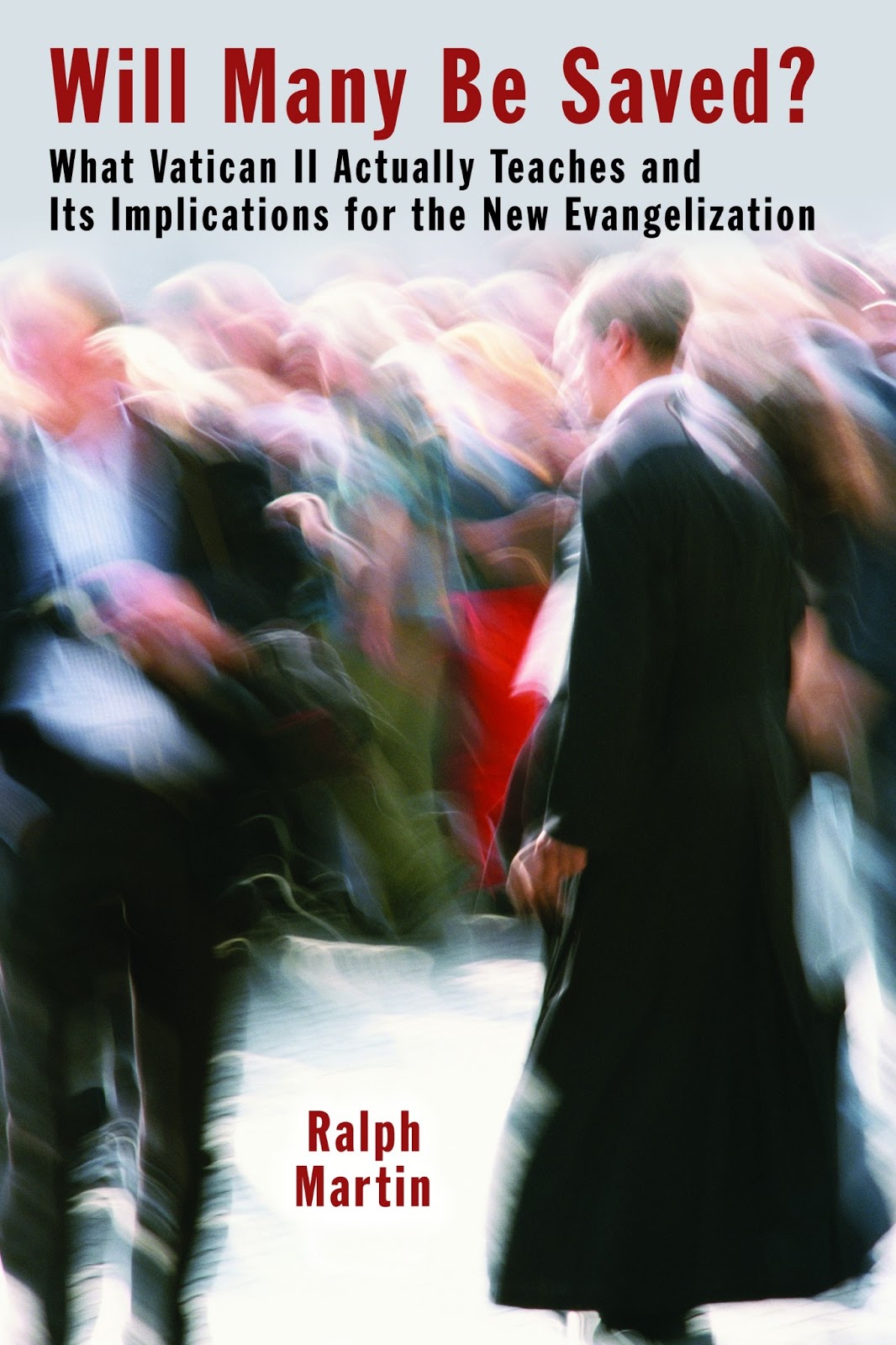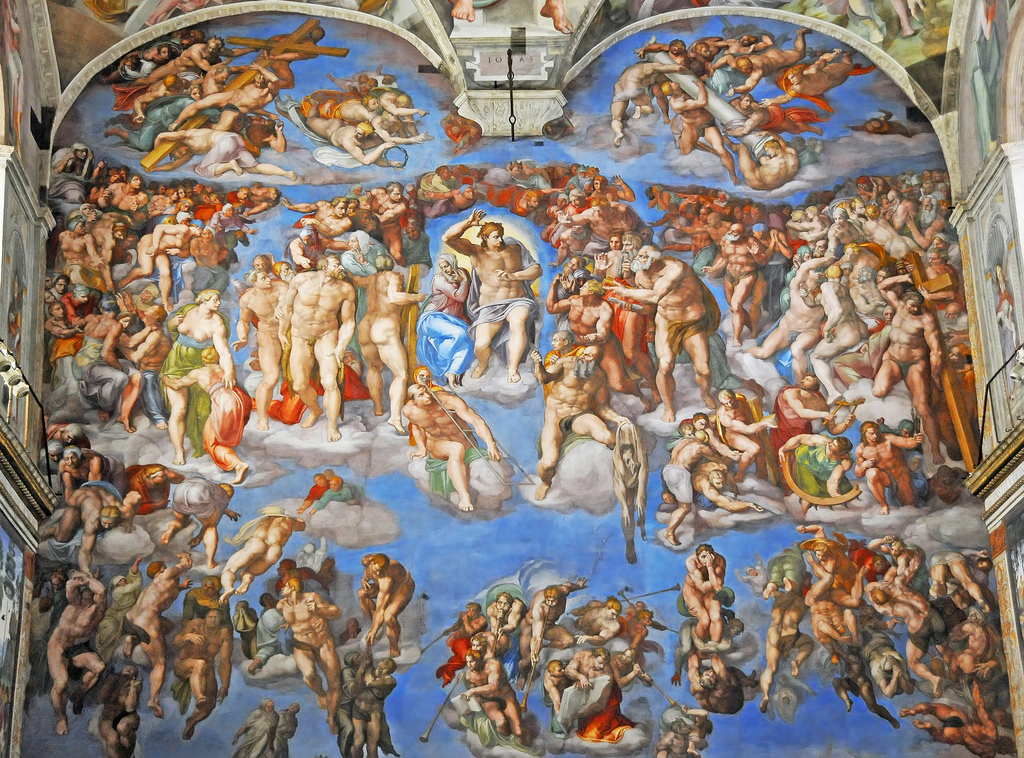-from http://www.catholicnewsagency.com/column.php?n=2383
-by Bishop Robert Barron
“Dr. Ralph Martin, Professor of Systematic Theology at Sacred Heart Seminary in Detroit, has written an important book titled “Will Many Be Saved?” The text received a good deal of attention at the recent synod on the New Evangelization, and its opening pages are filled with endorsements from some of the leading figures in the Church today. Dr. Martin’s argument is straightforward enough: the attitude, much in evidence in the years following Vatican II, that virtually everyone will go to heaven has drastically undercut the Church’s evangelical efforts. Why then, if salvation is guaranteed to virtually everyone, would Catholics be filled with a passion to propagate the faith around the world with any urgency? Therefore, if the New Evangelization is to get off the ground, we have to recover a vivid sense of the reality of Hell, the possibility, even likelihood, of eternal damnation for the many who do not come to a lively faith in Christ.
Martin certainly has some theological heavyweights on his side. Both St. Augustine and St. Thomas Aquinas believed that the majority of human beings end up in Hell. And the official magisterium of the church has insisted on a number of occasions that missionary work is vital, lest millions wander down the wide path that leads to perdition. Moreover, these theological and magisterial positions are themselves grounded in the witness of Scripture. No one in the Bible speaks of Hell more often than Jesus himself. To give just a few examples, in Mark 16, the Lord says, “Go into all the world and preach the Gospel to the whole creation. He who believes and is baptized will be saved; but he who does not believe will be condemned.” And in John 5, he declares, “The hour is coming when all who are in the tombs will hear his voice and come forth, those who have done good, to the resurrection of life, and those who have done evil, to the resurrection of judgment.” And in a number of his parables – most notably the story of the sheep and goats in Matthew 25 – Jesus stresses the desperate urgency of the choice that his followers must make.
To be sure, the conviction that Hell is a crowded place has been contested from the earliest days of the Church, and Martin fully acknowledges this. Origen, St. Gregory of Nyssa and St. Maximus the Confessor all held to some form of universalism, that is to say, the belief that, at the end of the day, all people would be gathered to the Lord. And this view was revived during the era of exploration, when it became clear to European Christians that millions upon millions of people in Africa, Asia and the Americas would certainly be condemned if explicit faith in Christ was truly requisite for salvation.
The universalist perspective received a further boost in the 20th century, especially through the work of two of the most influential Catholic thinkers of the time, Karl Rahner and Hans Urs von Balthasar. Rahner held that every human being is endowed with what he termed a “supernatural existential,” which is to say, a fundamental orientation toward God. This spiritual potentiality is fully realized through explicit faith in Christ, but it can be realized to varying degrees even in those non-Christians who follow their consciences sincerely. The supernatural existential makes of everyone – to use Rahner’s controversial phrase – an “anonymous Christian” and provides the basis for hoping that universal salvation is possible. Basing his argument on the sheer extravagance of God’s saving act in Christ, Balthasar taught as well that we may reasonably hope that all people will be brought to heaven. A good part of Balthasar’s argument is grounded in the Church’s liturgy, which demands that we pray for the salvation of all. If we knew that Hell was indeed a crowded place, this type of prayer would be senseless.
Now the heart of Martin’s book is a detailed study and critique of the theories of Rahner and Balthasar, and space prevents me from even sketching his complex argument. I will mention only one dimension of it, namely his analysis of Lumen Gentium paragraph 16. Both Balthasar and Rahner – as well as their myriad disciples – found justification in the first part of that paragraph, wherein the Vatican II fathers do indeed teach that non-Christians, even non-believers, can be saved as long as they “try in their actions to do God’s will as they know it through the dictates of their conscience.” (Ed. ‘God’s will’ is a very specific statement here, that as understood by the Catholic Church, not a general definition of the god-of-your-own-choosing/defintion, etc. This is so implied as to often be overlooked.) However, Martin points out that the defenders of universal salvation have, almost without exception, overlooked the next section of that paragraph, in which the Council Fathers say these decidedly less comforting words: “But very often, deceived by the Evil One, men have become vain in their reasonings, have exchanged the truth of God for a lie, and served the world rather than the Creator…Hence to procure…the salvation of all these, the Church…takes zealous care to foster the missions.” A fair reading of the entire paragraph, therefore, would seem to yield the following: the un-evangelized can be saved, but often (at saepius), they do not meet the requirements for salvation. (Ed. as defined by the Catholic Church, Mt 16:19.) They will, then, be damned without hearing the announcement of the Gospel and coming to an active faith.
So who has it right in regard to this absolutely crucial question? Even as I deeply appreciate Martin’s scholarship and fully acknowledge that he scores important points against both Balthasar and Rahner, I found his central argument undermined by one of his own footnotes. In a note buried on page 284 of his text, Martin cites some “remarks” of Pope Benedict XVI that have contributed, in his judgment, to confusion on the point in question. He is referring to observations in sections 45-47 of the Pope’s 2007 encyclical “Spe Salvi,” which can be summarized as follows: There are a relative handful of truly wicked people in whom the love of God and neighbor has been totally extinguished through sin, and there are a relative handful of people whose lives are utterly pure, completely given over to the demands of love. Those latter few will proceed, upon death, directly to heaven, and those former few will, upon death, enter the state that the Church calls Hell. But the Pope concludes that “the great majority of people” who, though sinners, still retain a fundamental ordering to God, can and will be brought to heaven after the necessary purification of Purgatory. Martin knows that the Pope stands athwart the position that he has taken throughout his study, for he says casually enough, “The argument of this book would suggest a need for clarification.”
Obviously, there is no easy answer to the question of who or how many will be saved, but one of the most theologically accomplished popes in history, writing at a very high level of authority, has declared that we oughtn’t to hold that Hell is densely populated. To write this off as “remarks” that require “clarification” is precisely analogous to a liberal theologian saying the same thing about Paul VI’s teaching on artificial contraception in the encyclical “Humanae Vitae.” It seems to me that Pope Benedict’s position – affirming the reality of Hell but seriously questioning whether that the vast majority of human beings end up there – is the most tenable and actually the most evangelically promising.
Love,
Matthew



